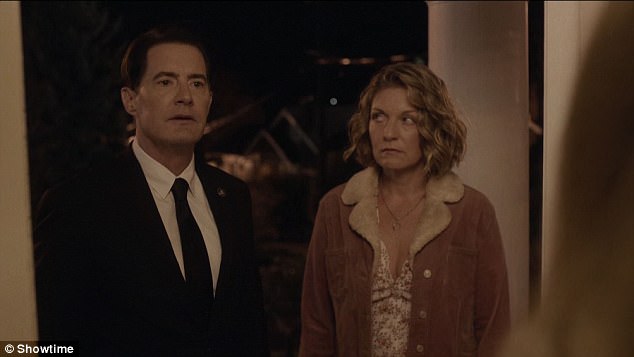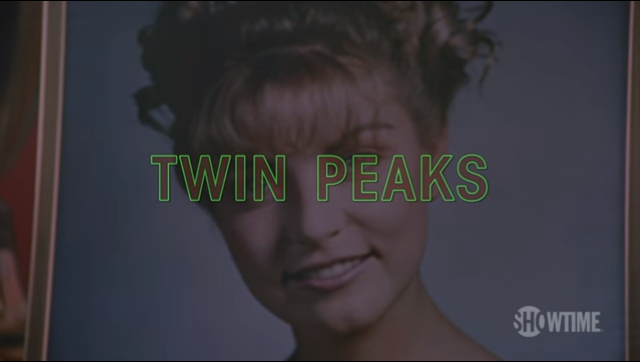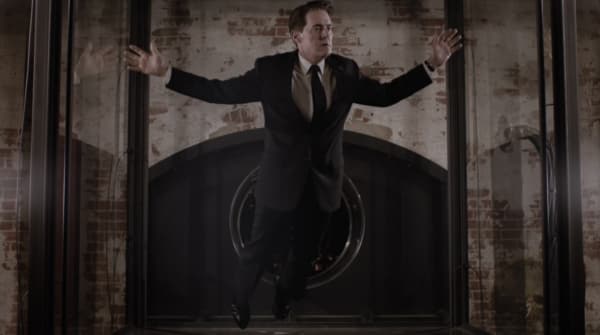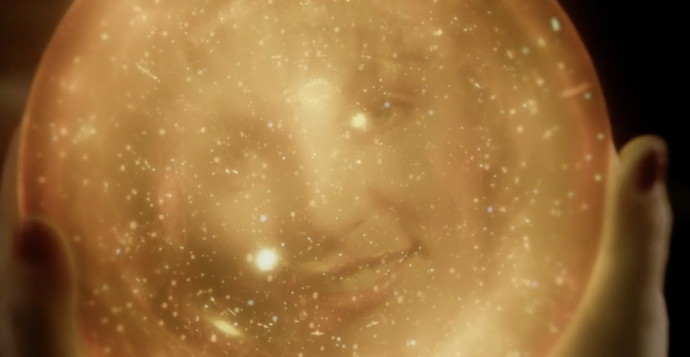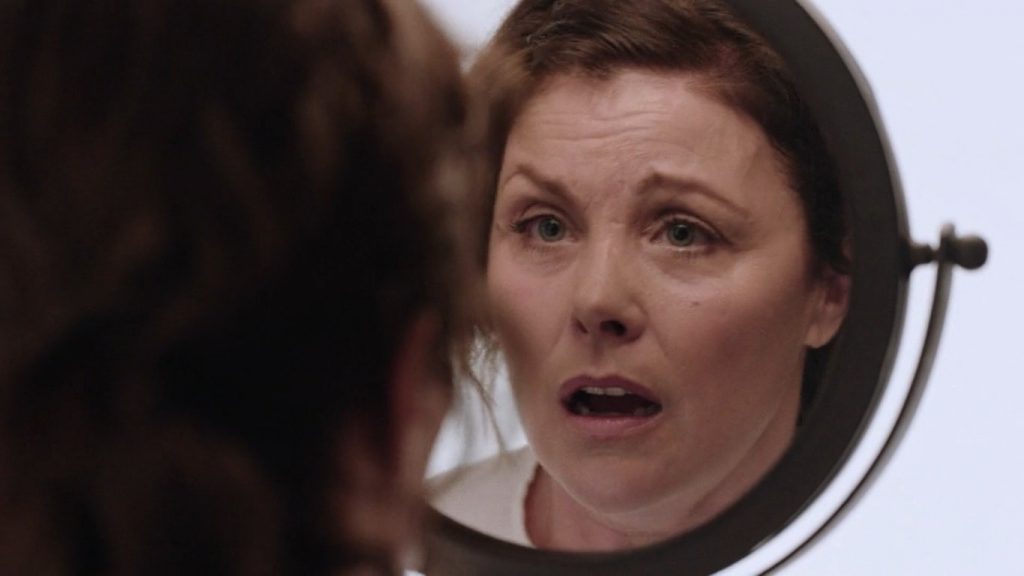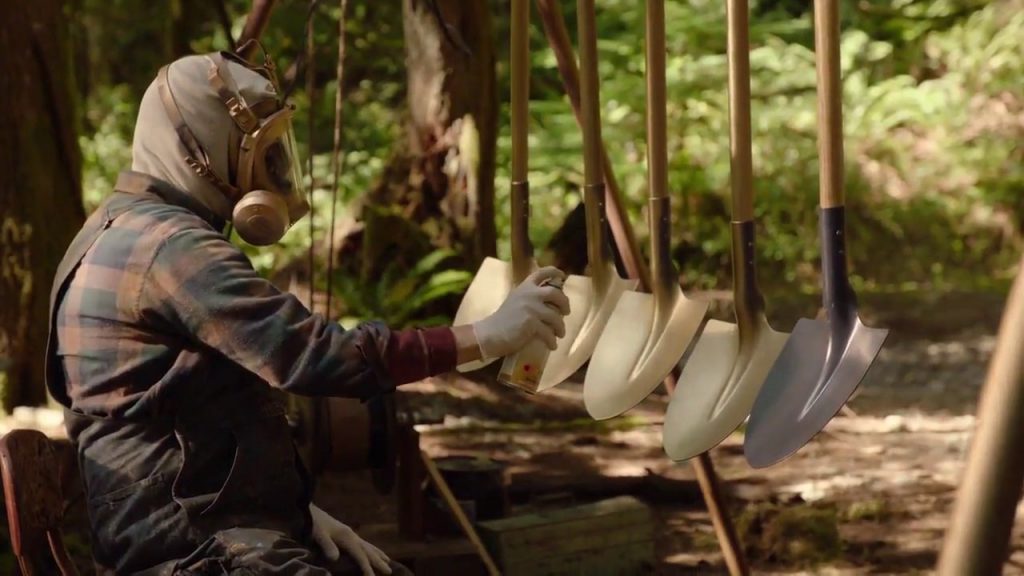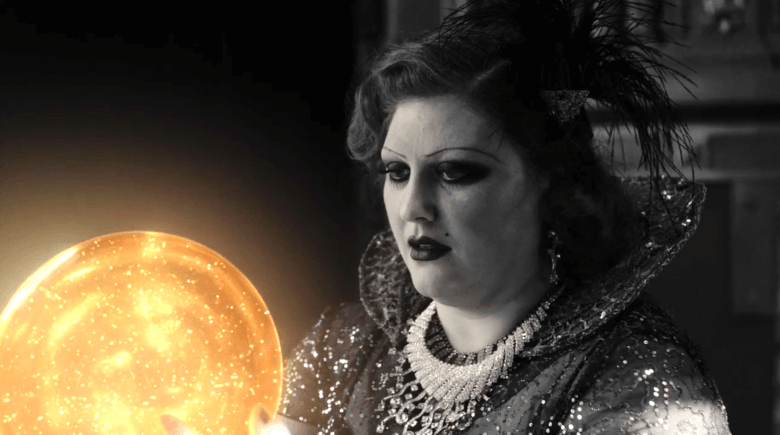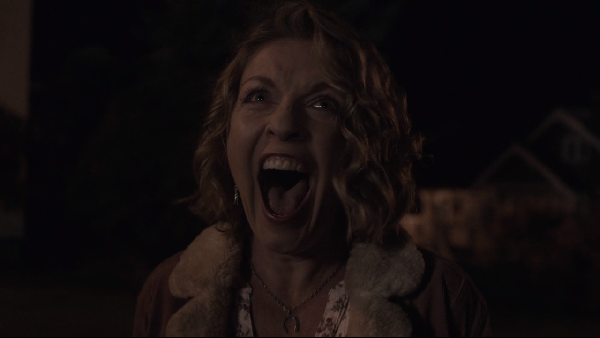It’s been over a week since Twin Peaks: The Return has finished spinning its tale. I’m angry. No, I’m more than angry. I’m pissed off at David Lynch. David Lynch has taken a gorgeous image of tragic decay and smeared it onto an 18 hour canvas as an abstract middle finger to the fans. I’m not talking about the dangling loose threads that have baffled so many critics (though, they’re right). I’m not talking about the loose narrative that spent much time weaving through various stories and minor characters to finally get to its point. I’m talking about the heart of Twin Peaks: The Return.
It all comes back to Laura.
“Laura is the one.” So says Margaret Lanterman. Twice. The first time she said this was in The Log Lady’s introduction to the pilot episode, saying Laura Palmer was the one leading to the many. Twin Peaks, original flavor, was about Laura Palmer and her trauma in absentia. Laura died before the opening credits even rolled, and the mystery of her unnoticed double life formed the backbone of the first 3/5 of Twin Peaks. Even though she was recreated through the wreckage she left behind, Laura was a character so absent that every episode closed with her framed graduation photo as a reminder of who she was.
The second time Margaret Lanterman says this is in Episode 10 of The Return. Due to her sickness and death, Margaret Lanterman only appears in an isolated room calling the sheriff’s station (mostly Hawk) and telling them about her visions. In this phone call to Hawk, The Log Lady explains that there is good in the world. She talks about dreams of time, circles being completed, and the force of existence flowing out like a river. It’s a masterful speech that recalls the ironies of life cycles and the flow of life. At the center of it all, Laura is The One.
Throughout Twin Peaks: The Return, Laura Palmer is also a character in absentia. Even though David Lynch opens every episode with Laura Palmer’s face superimposed over mountains of evergreens, Laura was still a character felt through her absence. Unlike the original Twin Peaks, The Return has little interest in Laura Palmer as a human being. David Lynch mythologizes and deifies her at every turn. She appears as a dream spirit in the first episode. In episode 8, Laura is reimagined as a ball of goodness created by The Fireman as a response to BOB’s creation in a nuclear explosion. The Twin Peaks Sheriff’s Department reopens Laura’s case based on a call from Margaret Lanterman but hardly discusses the matters at hand. Laura is only ever at the edges of this story until the very end.
Laura Palmer is Not The One
Twin Peaks The Return is not about Laura Palmer. Instead, it is about Dale Cooper. The only reason Laura Palmer’s case is reopened is because her murder was the case that brought Dale Cooper to Twin Peaks, WA. In the pilot for Twin Peaks, Dale Cooper arrives in town a few hours after Pete found Laura Palmer’s body on his morning fishing excursion. At the end of Twin Peaks, Dale Cooper was trapped in a world of his own suffering (the Black Lodge) and replaced with an evil version of himself ready to destroy the world as he himself had been destroyed. Our main solace laid in the prequel film Fire Walk With Me when Laura Palmer told him she’d see him again in 25 years.
The story of The Return is, ostensibly, Dale’s journey out of his own suffering. At the beginning of the series, “two” versions of Dale are running around, each corrupt in their own way. Mr. C, the evil version who escaped from the Black Lodge, is a no-good underworld thug whose reputation seems to precede him wherever her goes. Prominent evil people in Las Vegas seem to want Mr. C dead, the off-the-grid scum want nothing to do with him, and most people regard Mr. C as a monstrous force. The other version of Dale, Dougie, is Mr. C’s “fake Cooper” creation. Dougie was a prostitute-using gambling addict who owes large sums of money to loan sharks willing to kill him instead of merely breaking his knee caps. In either case Cooper’s earlier “goodness” and sense of morality is dead and has long been dead.
The first 15 episodes is Dale Cooper trying to shake himself out of his ruts. Drone Dale (a half-asleep version of the Good Dale that replaces Dougie early in the season) mindlessly works at an insurance company. Drone Dale is married to a tough-as-nails almost-harpy and is stuck raising Dougie’s kid. His life is so mindnumbing that he has to stick a fork in an electrical socket to remember his true purpose. Meanwhile, his evil side is still running rampant and is ready to kill everybody – including himself – to stay alive.
Finally, The Real Dale Cooper comes back and…does nothing. Dale doesn’t directly stop Mr. C; its only a phone call to Twin Peaks and his speaking with Lucy and Sheriff Truman that finally stops his evil side. In the first part of this stupid finale, Lucy shoots Mr. C and then some British punk with a green fist has to destroy the evil that lived inside Dale for 25 years. Laura has nothing to do with this…
Is Laura The One?
It’s only in the final two episodes that David Lynch begins to get to the supposed point of Twin Peaks The Return. In episode 17, Dale essentially posits the question “what if I saved Laura Palmer from her death?” OK, he doesn’t really say it. Instead, he demands that Teapot Philip Jeffries send him back to the day that Laura escaped her rapist by dying at his hands. On that fateful night, Laura gets off from James’ motorcycle at Sparkwood and 21 to enter the forest. In previous iterations, she was running away from Leland/BOB, her father/rapist, and into the lascivious arms of big, bad, dominating Leo Johnson and Jacques Renault. This time around, she runs into the arms of Dale Cooper who tells her he’s saving her from her fate. He’s taking her home.
In this iteration of Dale Cooper, he never understood that Laura was raped by her father for several years. Of course, this goes against previous iterations of Dale where he had pieced together the mystery of Laura Palmer. But, this Dale? Not so much. This Dale seems to think the most tragic part of Twin Peaks was Laura’s murder, and that he was doing right by her by protecting her from her death and returning her to her home and to her rapist. Through whatever forces, Laura is able to escape from Dale’s grasp on their intended return through the woods. Did she escape and run away from home? Is this just symbolism that he never understood her at all (a retcon of his character)?
By that same token, one of the criticisms of Fire Walk With Me was that it glorified the death of a sullied girl. Laura Palmer was a raped woman who sacrificed herself to stop the cycle of abuse that started when her father, Leland, was raped. But, she didn’t prevent Dale nor Sarah from being corrupted in their own way. Sarah, who had been completely absent for the second half of Season 2, returns with Dr. Jacoby to tell Major Briggs one line, “I’m in the Black Lodge with Agent Cooper.” Nobody seems to remember that she’s stuck in there too with no way out because we never see her roaming the halls among the red curtains. Maybe Laura’s death was in vain. Maybe David Lynch realized that forcing her death was a rash decision.
In the final hour of Twin Peaks The Return, we get a new character: Carrie Page. A down-on-her-luck waitress at a diner called Judy’s, Carrie is a damaged girl with a lot of baggage. Is this Laura Palmer? Did she run away from home to carry out a new life under a new name? Has she been healing and struggling under an anonymous name? Isn’t this the plot to Buffy’s Season 3 opener, “Anne”?!
In this alternate reality where Laura Palmer hasn’t died, Diane and Dale have switched personas and are now Linda and Richard. If, in this new reality where Laura wasn’t murdered, Dale is now a man named Richard, does Laura now go by the name of Carrie. Instead of trying to uncover the mystery of a dead girl, Richard/Dale almost seems to be looking for a missing girl, a case he has been unable to solve for 25 years. When he finally finds her at Judy’s, he’s confronted by authoritative forces trying to stop him from doing whatever he’s doing. Who are these men, and who are they working for? That’s unknown. Richard/Dale is uninterested in that question; he only knows he has to grab Laura/Carrie and bring her back to Twin Peaks.
Despite claiming that she has no idea who Laura Palmer is, Carrie has a dead body in her living room and is willing to get out of Dodge (even if it is with a crackpot who shows up out of nowhere). In the final stretch of Twin Peaks The Return, Laura/Carrie is increasingly horrified by the old memories she sees around her. When she finally gets to the site of her extended childhood rape, all the repressed memories come flooding back with one word – the final word of the series – “Laura.” She screams and the lights go out.
No, Laura is Not The One
What is David Lynch’s point with Twin Peaks The Return? He has repeatedly stated that Laura Palmer was very important to him. He criticized Twin Peaks for being less about Laura the human than Laura the abstract murder victim. David Lynch felt so strongly about Laura Palmer being absent from the series that he gave her The Secret Diary of Laura Palmer, a tie-in book that explored growing up as a victim of incestuous rape, and Fire Walk With Me, a prequel film to show her as alive and damaged by being continually raped at the hands of her father. Laura should be The One.
When it finally came time to resurrect Laura Palmer for Twin Peaks The Return, David Lynch held her back until the final episode. Worse, Twin Peaks The Return isn’t even about Laura Palmer in absentia. If I had to sum up the plot in a single oversimplified logline, Twin Peaks The Return is about Dale Cooper’s absence. What happens when the goodness of Dale Cooper is replaced by no-good officers like Chad? Why does it feel like our best intentions are ruined by behavioral cycles? Why is Shelley’s good intentions toward her daughter constantly met with a reiteration of her cycle? What happens to Audrey and Diane when Dale turns into an evil version of himself? Is this the world we’ve created when hope dies and cynicism reigns?
Despite Laura’s face being plastered over the opening credits, Lynch’s withholding her until the bitter end feels like a sick joke on the show. David Lynch spends so much time fawning over Drone Dale, Gordon Cole, Hutch and Chantel, Audrey and Charlie, Major Briggs’ dead body, and even Sam and Tracey. By contrast, Carrie Page is stuck in the back 30 minutes of the show. David Lynch denies the viewers her story. He doesn’t allow us to get to know Carrie, what she’s like, nor her life after being saved. We get only a brief glimpse of who Laura might have been if she hadn’t been murdered before David Lynch retraumatizes Carrie back into a horrified Laura. As much as David Lynch is trying to convince us that Laura Palmer is the key to the series, he sure spends a lot of time avoiding her and traumatizing her. He spends 17+ hours resurrecting her body just to bring her back to the place she was raped. Why? Who the fuck knows. If nothing else, it’s this that angers me the most.
Lynch didn’t just fuck with Laura Palmer. He put Audrey Horne in a white room where she seems to be dreaming a living nightmare about some dude named Charlie and a missing Billy. He sticks James in a rut singing Just You over and over again with a pair of zombie girls as backup singers. He completely eliminates Donna, but makes her little sister date a drug addict who shoots himself in the woods. He makes Shelley subject to the whims of her daughter, the same whims Shelley was prone to. He also avoids any mention of Ronette Pulaski, the girl from the wrong side of the tracks who does almost the exact same shit that Laura did.
I ate one of the Lauras and now she’s missing
Over the past week, I keep coming back to the same question, “what’s the point of Twin Peaks The Return?” The original Twin Peaks was about a town who constantly looked the other way when they saw somebody was in trouble. When Laura was in trouble, drug dealers profited from her coke habit, pimps whored her out, boyfriends used her for status and money, and everybody else looked the other way. Hell, when Shelley was being abused by Leo Johnson, people gave her makeup tips. It was about the corruption of money and how the desire to keep the peace can allow the worst people to get their way.
So, what is the point of The Return? Is it about the inverse? Now that Laura’s trauma has traumatized Dale, how has their absence changed the town and the world? How have the people they were most connected to changed while they were gone? Has Laura’s murder turned Sarah Palmer into a grieving shell of a woman who can kill people without blinking an eye?
Or, is it about stasis and waiting? Maybe we all think we’re waiting for a hero, and need somebody to save us? Nadine looks to Dr. Jacoby for salvation, even purchasing one of his spray-painted golden shovels to dig her way out of the shit, and winds up saving herself. Other people have been waiting for Cooper to come back to save the world and they’re stuck in a form of stasis, slowly stalling out over time. Hell, Norma has owned the Double R for 25 years, and nobody has opened another important competing diner in that time. Harry’s older brother runs the sheriff station where Lucy and Andy still sit in waiting. Big Ed still runs the gas station and even Benjamin Horne still runs the Great Northern. Even Gordon Cole is still in the same position he always way (though Denise has moved above him).
Is it a meta-commentary on television watching and the original series? Sam and Tracey practically open the show by Netflix Glass Box and Chilling. The first season of Twin Peaks (including the pilot) is 430 minutes, also the exact mile marker that Dale and Diane have to cross before becoming two different people: Richard and Linda. We revisit the same songs (James’ Just You), sometimes with the same purpose (Julee Cruise’s The World Spins signified that “it was happening again” when Maddy was murdered, and signified it was happening again when Dale lost track of Laura in the woods). Maybe David Lynch means we’re retraumatizing Laura Palmer every time we rewatch the series? Episode 8 in the original series was the explosion of cliffhangers that ended season 1, and in The Return it was Evil Dale’s first death leading to the abstract History of Evil. Episode 18 in the original series is the episode where they have a funeral, then change on a dime to rudderless zany town antics; Episode 18 in The Return is where the zany town antics cease and we finally get to Carrie Page’s story.
Is it about modern politics? Big Cities are the source of trauma. Sam and Tracey, along with our first glimpses of the golden ball and floating Dale Cooper are in a ritzy expensive New York penthouse. Many of the orders to kill people come from a Las Vegas executive. Dougie and Drone Dale operate out of Las Vegas. But, many of the minor stories – the discovery of Major Briggs’s body, Evil Dale’s arrest, all of Twin Peaks – happen in small cities. Dare I say, they happen to small cities.
Maybe The Return is all of these things. But, what it most pointedly isn’t about is Laura Palmer.
Ew. Just how old are those chocolate bunnies anyways?
Maybe, just maybe, it is about a larger fight between good and evil. Last year, Mark Frost released The Secret History of Twin Peaks, a semi-unrelated book that gives more history to the grand mythos of the show. In the area of the PNW near where Twin Peaks is set, Frost mythologizes that there is a black lodge and a white lodge pushing out forces of good and evil. This is split into real life dichotomies, such as the Illuminati vs the Masons. He goes all the way back to Meriweather Clark venturing into the area and aligning himself with the good, only to be murdered in mysterious circumstances after he was a governor. The president declared this a suicide even though he shot himself in the back of the head. (This is verifiable history, BTW)
This battle for the soul of the human race is an ever lasting battle. In the case of Twin Peaks, perhaps this is leading to a much larger fight than one thinks. Instead of focusing on one small town, Lynch takes us to France (in a dream) and Rio de Janeiro and Las Vegas and New York. The battle for good and evil is everywhere, and we have to open our eyes to it. Perhaps, episode 8 posits, the battle between father and daughter, the fight over the future, is one of an epic battle for the soul of the world. Perhaps, instead of the Black Lodge being a metaphor for our personal struggles with morality, we’re the symbols for the fight between good and evil.
What if Laura is just a fictional character that has been created by The Fireman in the White Lodge to do battle with a true evil borne out of a nuclear explosion? What if Dale is doing the right thing? What if Carrie/Laura going up to the source of all her repressed horror and misery and shouting at it is actually a final stand-off between good and evil? What if her scream isn’t a scream of terror and memory, but a battle cry against the evils of the world? What if the house’s lights going out, with a notable spark and pop, is a symbol that the evil has been defeated (remember, electricity)? What if good has won and that’s why there’s no static electricity in the final logo?
In turn, what does that do to the stories of Twin Peaks and Fire Walk With Me? I’ve never been prone to discussing BOB and The Man From Another Planet as more than manifestations of the low level evils that flow through the world. But, maybe this ending is for those who love puzzling over the grander world view of Twin Peaks.
Maybe it is not about me
In writing this essay, I’ve started to come to terms with The Return. I know I’m angry because of what it did to Audrey, bottling her inside a white room with no explanation (leaving her in the same is she/isn’t she dead state she was in after the Season 2 finale). I know I’m angry because David Lynch retraumatized Laura without giving a good reason as to why. I know I’m frustrated with the lack of closure as to what some characters are even doing.
Perhaps that’s my problem. In both Fire Walk With Me and Twin Peaks, I mostly understood what the characters were doing and why (though, Ben’s Civil War insanity is still unscrutable). In The Return, there are many, many emotional cliffhangers that we’re never going to figure out. What happened to the guy who owned the truck that ran down the kid? Who is Red and why can he do magic? What is going on with Audrey?!!? David Lynch didn’t cliffhanger the next step in their story, he cliffhangered their whole purpose.
But, maybe that’s my problem. I’ve never had a problem seeing the emotional truth of David Lynch’s stories, and this is one of the few times where the emotional truth eludes me. What is Lynch trying to say about people? About life? About us? About humans? Maybe people more prone to big grandiose puzzles that unite the world will get more out of this. I can’t see it yet. Or, at the very least, I don’t want what I see. Maybe later I will. But, not yet.

